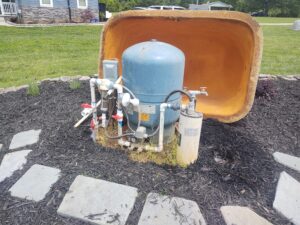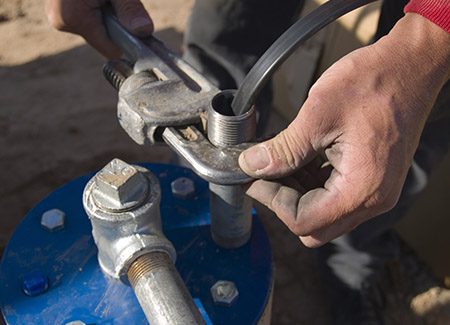Understanding the Secret Parts of Effective Water Filtering Solutions

Importance of Water Filtration Equipment
Water purification systems play a critical function in ensuring access to risk-free and clean drinking water by successfully eliminating impurities and impurities. These systems are vital in dealing with the growing problems over water high quality and the potential health and wellness risks related to consuming contaminated water. By making use of various purification mechanisms such as reverse osmosis, turned on carbon, and UV sterilization, water purification systems can efficiently remove damaging materials like germs, viruses, hefty metals, and chemicals from the water.
Additionally, water purification systems assist to boost the taste and odor of water by removing chlorine, sediments, and other toxins that can impact its top quality. Water Filtration Systems. This improvement in water top quality not only makes it much more tasty yet also motivates people to drink a sufficient quantity of water daily, promoting better hydration and overall health
Kinds Of Purification Elements

Physical filters are developed to literally stress out impurities from the water. These filters can be made from materials like ceramic, carbon, and even sand, and they function by capturing fragments bigger than the filter's pores as water travels through.
Chemical filters use various chemical processes to eliminate pollutants from the water. Examples include triggered carbon filters, which adsorb pollutants, and turn around osmosis membrane layers, which utilize stress to different pollutants from the water.
Organic filters use living microorganisms like germs or algae to damage down raw material and toxins in the water. These filters are often used in wastewater therapy plants or all-natural water filtration systems.
Recognizing the various sorts of filtering elements is important for choosing the most suitable water purification system for specific filtration demands.
Feature of Sediment Filters
Sediment filters play a crucial duty in water purification systems by properly catching solid particles put on hold in the water. These filters are commonly the very first line of protection in a filtration system, removing larger fragments such as sand, silt, dirt, and rust prior to the water moves with finer filtration stages. By trapping these sediments, the filters prevent them from getting to downstream parts, thus expanding the lifespan and performance of the whole system.
The function of debris filters is essential in preserving water quality and shielding delicate equipment from damages brought on by particles. Furthermore, by removing noticeable particles, debris filters enhance the quality and taste of the water. Consistently replacing or cleansing sediment filters is important to make sure optimal efficiency. Neglecting this upkeep can lead to blocking, reduced water circulation, and endangered filtering performance. In general, debris filters are vital components that contribute dramatically to the effectiveness of water filtering systems.
Role of Activated Carbon Filters
Playing a vital duty in water filtration systems, triggered carbon filters are critical in getting rid of impurities and contaminants from the water system. These filters are made to adsorb and catch a vast array of pollutants, including chlorine, unstable organic substances (VOCs), chemicals, and herbicides. The triggered carbon product has a huge surface, permitting the reliable capturing of impurities through a procedure called adsorption. As water passes through the filter, the activated carbon attracts and holds onto the impurities, ensuring that the water that comes out on the other side is cleaner and safer for consumption.
Turned on carbon filters are highly reliable at enhancing the preference and odor of water by reducing chemicals view website that can influence its quality. Due to their convenience and dependability, activated carbon filters are a crucial component in making sure that water is purified to the greatest standards before getting to consumers.
Recognizing Reverse Osmosis Systems
Reverse osmosis systems are sophisticated water filtration systems that utilize an innovative process to get rid of contaminants and pollutants from alcohol consumption water. These systems work by applying stress to the water, forcing it with a semi-permeable membrane layer. This membrane serves as an obstacle, permitting only distilled water particles to pass through, while blocking bigger particles such as minerals, chemicals, and other pollutants. Because of this, the water that appears beyond is dramatically cleaner and safer for consumption.
In addition, reverse osmosis systems are fairly low-maintenance and can be set up under the sink or in a central purification system, giving practical access to tidy water throughout the house. Generally, comprehending how reverse osmosis systems function can assist individuals make educated decisions about their water purification requirements.
Conclusion
In verdict, efficient water purification systems are important for ensuring risk-free and tidy drinking water. By comprehending the feature and function of each part, individuals can make educated choices when selecting a water filtering system.
Water filtration systems play a critical function in making certain access to secure and clean drinking water by Full Report properly removing pollutants and contaminations. Discover More By making use of various filtration systems such as reverse osmosis, turned on carbon, and UV sanitation, water filtration systems can effectively get rid of unsafe substances like bacteria, viruses, heavy metals, and chemicals from the water supply.
Debris filters play a crucial role in water filtering systems by successfully recording strong fragments suspended in the water (Pump repairs & installation).Playing an important function in water filtering systems, turned on carbon filters are crucial in getting rid of contaminations and impurities from the water supply.Reverse osmosis systems are innovative water purification systems that use an innovative procedure to get rid of impurities and contaminations from alcohol consumption water